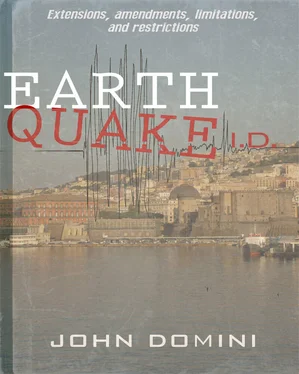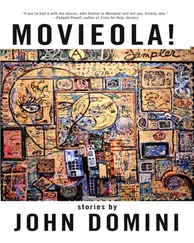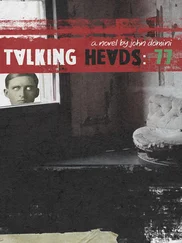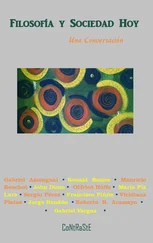But how was Barbara going to clear her head here at the Refugee Center? At this a lake of rippling nylon, spread across one of the broader hollows in the landscape — nylon or some other faded synthetic, all of it rippling from the neediness beneath the fabric? Again a crowd greeted the van. Again the gang gathered with hands in the air, waving, seeking, and one or two thumped the vehicle’s windows and panels. There were shouts, too, rough open syllables, vaguely Italian. Barb couldn’t pick out the words at first. Faced with a crowd like this, it took an effort just to realize that no one held up any bits or pieces for Paul to bless. No one carried church bric-a-brac. Yet the terremotati filled the parking lot, a patch of flattened grass. From there the tent city ran down-slope, here and there revealing a nylon cord or an aluminum pole, or a scrap of ground the color of driftwood, or — something else again — a flutter of laundry in party colors. Barbara thought of the old-city warrens in which she’d spent her mornings, this past week. From an occasional tent-corner there trailed a few bright ribbons, as colorful as the laundry. The mother even spotted something like one of the prayer ojetti , perhaps halfway downhill. This appeared to be a group photograph, a collage in an ornate frame, under a corrugated plastic rain cover of dirty turquoise.
Also here and there played shadows, children still intent on their games. The ones who’d climbed into the sunlight, the flat space surrounding the van, tended to be the parents or grandparents. Their crumpled faces came in a dozen shades of black, under unkempt Afros or wobbly dreadlocks.
The mother had a question. “These are mostly illegals, right?” She looked to Kahlberg. “I’m saying, do they even have a work visa?”
The officer went on checking the crowd. “The epicenter was outside the city, in the periphery. That’s where you get the more transient population.”
“And the — the radicals? On the hunger strike?”
The liaison shot her a glance. “One has to expect,” he said slowly, “a certain amount of political tension in marginalized populations. One has to consider, as well, that many of these people arrive on these shores with criminal intent. Their sole purpose for being in Italy is to generate as much income as they can. Chris, big shooter. You know what the old Silk-man’s talking about, don’t you?”
The shifts of tone sounded doubly spooky under the blurred shouts from outside.
“Libya used to be an Italian colony,” Chris said. “Ethiopia too.”
“And Ethiopia—” Barbara began.
“See,” Chris said. “Mussolini was all fired up about a new Roman Empire.”
“Chris, Ethiopia is starving.” Barbara tried not to glare.
“A seriously depressed economy, big shooter, over a disturbingly long term.”
“That’s what I’m saying.” She concentrated on the Lieutenant-Major. “So far as the folks outside are concerned, Naples is the land of milk and honey.”
Kahlberg stared back mildly.
“You know,” John Junior said, “when Mom was a kid, she couldn’t tell the difference between the pictures of Jesus and the pictures of Che Guevara.”
“Stop it, stop it.” Barbara whipped around; the teens were grinning, slapping hands. “If I hear one more stupid sarky remark—”
“There’s Papa!” shouted Sylvia. “Papa, right there!”
Right there. Jay changed the whole shape of the scene beyond the windows. The man had his vice-president’s swagger even here, and as he approached the Humvee you could see he was bigger than nine tenths of the brown crowd around him. Plus he wore a chef’s baggy dress whites and a white long-visored cap, an outfit more bright and bleached and complete than anything among the faded dashikis and tourist T-shirts surrounding him. The terremotati appeared happy to see the Jaybird, including a few lighter-skinned folk Barb spotted now. Italians, these might have been, but more likely they’d drifted here out of the jigsaw nationalities across the Adriatic. A face or two out there looked Arab, as well. In any case everyone smiled as they made way for the capo . One of the blackest of the refugees, a man whose seamy face called to mind the folds in Father Cesare’s robe, mouthed what must’ve been some sort of wisecrack. His eyes, though they were hardly more than glints in a cracked rock, glowed with obvious warmth. Barb’s husband matched joke for joke, meantime. He shot a smirk one way and, glancing the other direction, tapped the peeling brim of a baseball cap. This was a person who would do nothing rash, a person with no hard feelings.
Barbara on the other hand was startled just to see her husband slide open the van’s door. She hadn’t known they were unlocked.
“Hey,” Jay said. “Have I been looking forward to this.”
“Papa,” Dora said, “you look so sharp!”
“Well I feel sharp. Feel real good, baby doll. Feel good all the time, because I know I’m helping people.”
The father tugged the long bill of his cap. Barbara looked over the bandage by his ear. Jay’s bruise had faded, the scar had shrunk, but he was careful about keeping the spot protected. Now he found her eyes.
“We’re helping a lot of kids here, too,” he said. “A lot of these boys and girls, without us they’d have no chance.”
Around his gleaming bulk came the smell of the crowd, unwashed and sun-blasted. The family stepped out into chock-full air, as much as into the flap of tenting, the creak of plank pathways, or the singing of the aluminum poles each time the breeze picked up. Jay led the group down through the jumble to his central tent-offices, stopping several times for introductions and more banter. He took into account, as well, how the NATO guardsmen affected the refugees. The poveri hadn’t even had time to grow accustomed to his own armed tagalong, and now the family had arrived with two more. The campers who were made the most nervous appeared to be the most African, with tribal scarring and brimless sequined caps. Their steep-cheeked faces fell, when these men and women spotted the extra brace of gunslingers, both of them blonde and pale to boot, down from the European North. The tent-dwellers from the deepest South gave the troopers the widest berth, backing into the mud that bordered the plank byways, never mind that they were barefoot or, at best, in plastic flip-flops. Everyone in camp, really, backed away from the pair in uniform. The mother was grateful that the soldiers had slipped off their padded bulletproofing, and grateful too that Jay adjusted his patter. The man started to sound like a schoolteacher. He made it clear that he would never have brought his family to the camp if he believed there were any possibility of trouble.
“The heavy artillery,” he said, “that wasn’t my idea.”
As they went, Barbara and the kids also learned about the camp’s layout, a wider semi-circle that sloped down to a smaller one. It was an amphitheater, and down at the stage lay the important setups, including jay’s beloved kitchens. Papa directed a staff of twenty-plus, something else the wife hadn’t realized. Besides that, the Jaybird was the lone worker from the U.S. He had his Coordinator’s work cut out for him, needing to communicate across several varieties of anti-American resentment. Barb thought of the electronic misunderstandings that JJ and Chris got into over the internet.
Yet she alone seemed to understand the difficulty, and to see through the upbeat charade. Barbara alone, the half-out-the-door wife, seemed to be the only one who worried for the capo , even as he struck poses that implied he was everybody’s friend. But how could these poveri connect finally with this transplanted food-industry exec? Most of them spoke a mangled Italian, and more than once she heard them break down into pidgin French or a sub-Saharan patter. From underfoot, meanwhile, came the suck and pop of the walkway boards in pockets of mud. Not that it had rained, out here; the water was the run-off from the hose-and-coat-hanger showers — if not from some less sanitary facility. Plus chalky clouds of pesticide would waft across the family’s path every now and then. Lice powder, Jay explained. The Site had a doctor come in and dispense a fresh dose every week. But for Barbara the acid-flavored dust only reinforced her unhappy take on the place, as bad as that first day down in the original city, a reeking underworld in which you could barely speak with the ghosts.
Читать дальше












